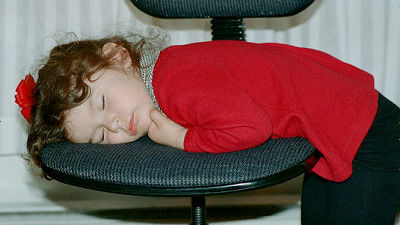"Validation bias" to learn with puzzles to test your problem solving skills

ByTintin 44
It is "ability to solve problems" how to overcome the problem situation is required when hitting some problem that can not be avoided as long as you live with work or living. And when I tried out a puzzle that allows us to easily test the problem solving abilities published by The New York Times, it has highlighted psychological problems that everyone is likely to fall into.
A Quick Puzzle to Test Your Problem Solving - The New York Times
http://www.nytimes.com/interactive/2015/07/03/upshot/a-quick-puzzle-to-test-your-problem-solving.html
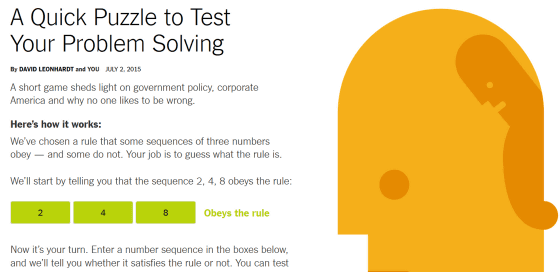
When opening the above URL, the number "2, 4, 8" is displayed around the middle of the page. A puzzle to test problem solving skills is to derive the regularity of the sequence "2, 4, 8".

In order to derive regularity, you can check by entering numbers in the three boxes displayed at the bottom. Since I was thinking at the moment when I saw a series of numbers was "I might be doubling the number one previous ..."
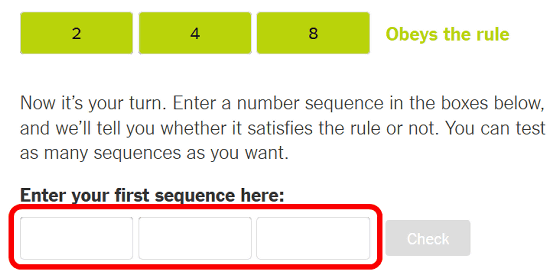
Please enter "3, 6, 12" to check whether it is correct answer and click "Check".

"Yes" is displayed and we found that "3, 6, 12" you entered follows the regularity of the correct answer.

Next time we will test with "4, 8, 16" to get more confidence.

This was also "Yes".

Just to be sure, check "5, 10, 20".

"5, 10, 20" is also "Yes", all the sequences confirmed so far are "Yes", so the guess that "You may double the previous number" turned into confidence It was.
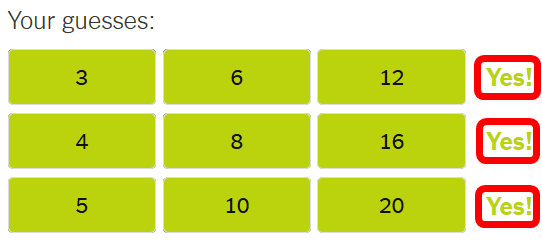
In the end answer to the white box, enter "I'm doubling the previous figure" and click "I think I know it".
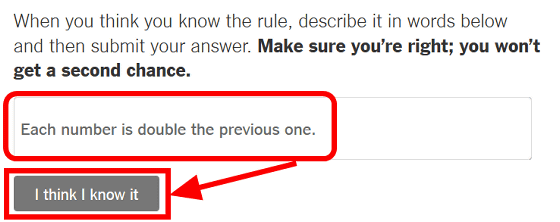
When clicked, the correct answer was displayed right under and the regularity of the correct answer was "it was larger than the number one before". Whether "1, 2, 3", "3, 6, 9" or "2, 100, 500" can be used, the difficulty of regularity is too simple, thinking "Is not it a hook problem?" Level to go. However, according to The New York Times, those who mistyped this puzzle seem to have big problems in thinking process in solving problems.
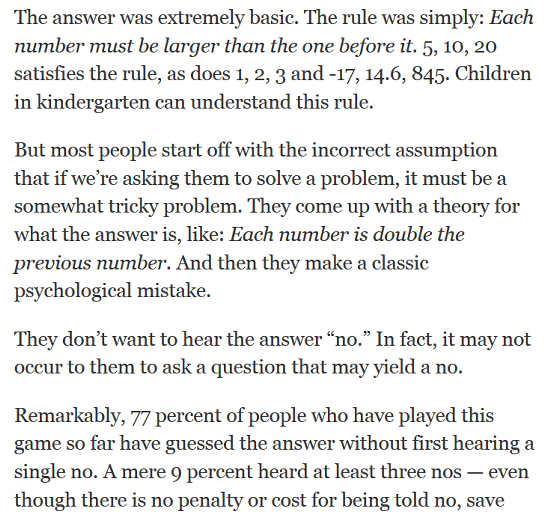
First of all, most people just assume that "the test to test the problem solving ability" simply means "the problem should be difficult to solve easily". It is the "answer" that people who have the belief that "it should be difficult" thinks first of all by looking at the problem is "answer". Looking at the sequence of "2, 4, 8", we will derive the "answer" that "You may be doubling the previous number." If you test "3, 6, 12" which corresponds to the regularity you actually guessed, it will be "Yes", the guess will gradually turn into confidence, and finally "double the previous number I think that it is correct "is wrong.
The problem with the thought process of the wrong person is that the presumed regularity is performing confirmation work on the premise of the correct answer. What I mean is that when I checked the correctness I guessed, I always took a confirmation method that the answer would be "Yes". In the case of this time, when confirming the regularity "Doubled one digit before" which was guided, "3, 6, 12", "4, 8, 16", "5, 10, 20" "I will answer" Yes "if there is speculation" I asked a question.

ByDan Simpson
In fact it seems necessary to confirm with the question that the answer is "No" instead of "Yes". However, humans have a psychological tendency to dislike behaviors that their ideas are denied, and 77% of those who challenged in the puzzles of the series got answers without doing "No question to become" Thing.
It emerges from the series of quizzes that many people haveConfirmation biasThe phenomenon called. Confirmation bias is a phenomenon that observes others based on prejudice, gathers information that is convenient for you, strengthens prejudice, and is used in social psychology. In the sequence puzzle, I checked the regularity based on my "answer" I thought, and gathered only the information "Yes" that is convenient for me, so I made a mistake.
It is very important to solve the problem to see how wrong the solution is, not to confirm that the solution method you derived is correct. Some scientists seem to confirm the disprove information of the theory which it led to avoid confirmation bias. Collecting information that denies your idea is not a pleasant thing, but if you hit the problem you can avoid negative evidence by listening to negative opinions.
Related Posts:
in Note, Posted by darkhorse_log




